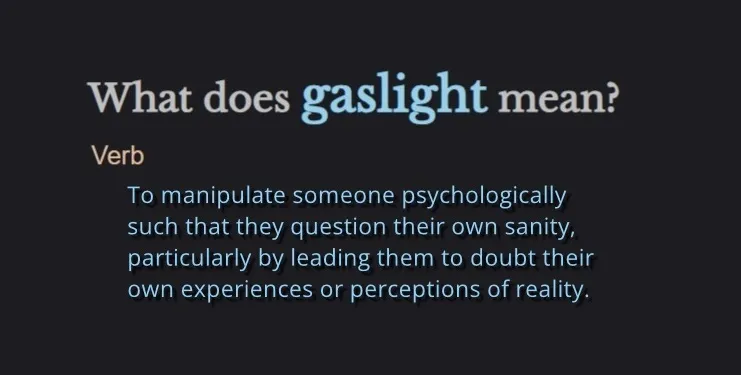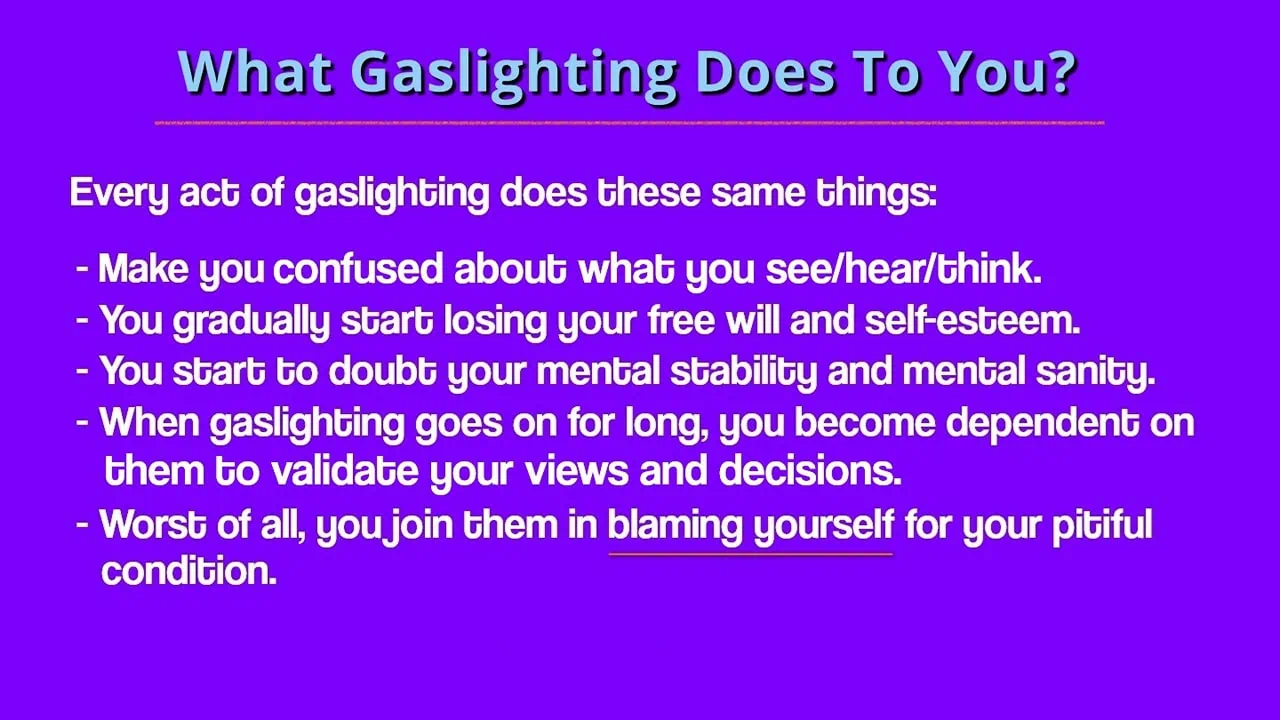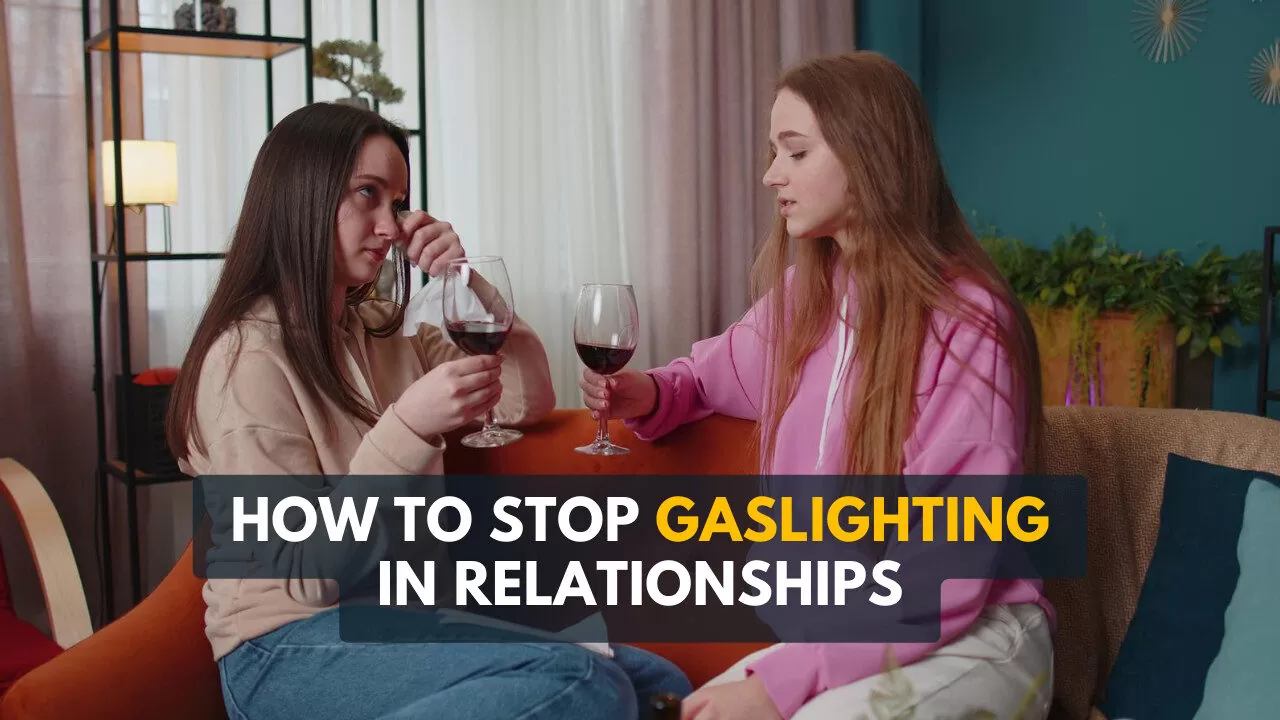Today's Tuesday • 7 mins read
Narcissists are so obsessed with themselves that they will lie through their teeth to make you feel horrible so that they can feel better than you.
They are expert manipulators who know how to make you doubt yourself through their lies. They make you question yourself so frequently that you start to suspect if you are going crazy.
That is gaslighting — a form of emotional abuse that makes you unsure of your own experiences.
Narcissists gaslight you intentionally so that you can no longer trust what you saw, felt, heard, or derived.
And then, when you turn to them for validating what really happened, they feel great. It feeds their ego and grants them greater control over you.
But you can break that cycle and stop the narcissistic gaslighting in your relationship.
What Is Gaslighting?
Gaslighting is a form of emotional abuse that manipulates the victim into questioning his or her own reality, making them believe that they are going insane.
It’s a cunning tactic that narcissistic abusers use to maintain power and control over their victims, while also boosting their self-esteem.

The term originates from the 1938 stage play Gas Light and its 1944 film adaptation. The husband tries to convince his wife that she is losing her sanity. Actually, it’s he who is distorting small things in their house and insisting that she is seeing or remembering things incorrectly.
How To Stop Gaslighting In Relationships?
Gaslighting can be difficult to identify because some people might not realize they are being manipulated. Moreover, the gaslighters are often charming and charismatic.
The gaslighter attempts to convince their victim that they are imagining things and causes the victim to question their own memory, perception, and mental balance.
1. Determine if you are being gaslighted.
How do you recognize if you are in a relationship with a gaslighter? Check out these signs:
- Are you always in self-doubt and second-guessing yourself?
- Are you constantly reaching out to others to ask what you should do?
- Do they always find faults with your version of events or line of reasoning?
- Do you mostly find yourself in a confused and dazed state, unable to decide things?
- Do you often apologize to them for asking them to finalize your decisions and validate your conclusions?

Be acutely aware of these classic gaslighting phrases.
2. Respond to the gaslighter with non-attached assertiveness.
Gaslighting often starts with an innocent comment such as “I think you got it wrong,” but becomes more intense as the abuser gains confidence and power over their victim.
When the victim tries to assert they are right, the narcissist may shout at them to bully them into submission. When the victim responds by sobbing or crying, they may respond, “You’re too sensitive.”
Respond with, “Okay, so you think that’s what happened.” And walk away.
That is non-attached assertiveness.
The gaslighter tries to isolate their victim by making them believe they are crazy or overreacting, and then convince them that it is all in their head.
This makes them avoid interacting with other people out of fear that they might actually be judged as crazy.
Respond by reaching out to people who support you. Build a network of support outside of the relationship.
If you don’t have supportive friends, reach out to a narcissistic abuse support group. Do not let yourself get cut off from others.
The gaslighter may also try to make you feel guilty for questioning what they say or think you should trust them more than yourself.
If you feel like you are being gaslighted, do not try to argue with the person or show any signs of anger. Instead, try to find a way to get out of the situation without getting into an argument.
3. Recognize your own worth (not what the gaslighter tells you).
Do not feel guilty for being shown down by the narcissist abuser. It is their manufactured judgment that you are worthless in this world.
After all, they are gaslighting you to make you mentally weaker. Remember that as human beings, we have the right to feel anything we want as long as it does not harm others.
Ignore all opinions that others hold of you, especially those that the narcissist tosses at you to destabilize you mentally.
Recognize your self-worth and engage in activities that enhance it. Re-engage with things that you were good at before you met them.
Start writing a gratitude journal. Go out on a tour with someone else, or even by yourself. Get a pet. Bring home a few plants or goldfish to care for.
Doing things you enjoy doing will gradually expose you to bigger challenges, and will help you gain confidence.
This newfound confidence helps to prove that everything the gaslighter tells you is a lie.

4. Set boundaries and clearly communicate them to your gaslighter.
How to set boundaries with a gaslighter so that they can not feed you lies and false versions of events?
Narcissistic gaslighters are very good at twisting your words and making you feel guilty.
They are masters at convincing you that their version of reality is the only reality. They will use their threateningly convincing tone to make you question your own thoughts and feelings.
It is important to set these six boundaries with them. Communicate with them clearly that you do not want them to cross those lines, even in emergencies.
For example, you are at planning your day with your morning coffee, and under no circumstance, they can reach out to you to ask something. Boundaries stop them from manipulating you easily.
Do not let the gaslighter know what you are feeling or thinking. When they ask, respond with a question of your own or give an ambiguous answer.
Do not share too much information with them either, especially if it is something personal.
Setting boundaries with a gaslighter can be difficult because they will say anything to get their way.
One effective way to do it is to refuse to engage with them when they are trying to provoke you.
5. Record your activities and make your own decisions.
Start recording what you do, as much as possible, and as soon as the event finishes.
It will help you gain confidence when the gaslighter tries to convince you with their insane version of your reality.
It will also help you to organize your thoughts so that you can take your decisions more assuredly based on recorded facts.
You may ask someone else’s opinion on your issues, and write them down too.
However, strictly remember to not write down the versions that the gaslighter says.
6. Find someone outside the relationship to talk to every day.
The best way to stop gaslighting in a relationship is by getting an outside opinion from someone who knows you well so that you can see things from a different perspective.
You should also try taking away the attention from your partner when he or she starts gaslighting you by changing the subject or even walking away if necessary.
7. Seek help from a mental health therapist or counselor.
If you’ve been a victim of gaslighting, seek help from a mental health professional, a loved one, or even a support group like NAMI.
Final Words
Gaslighting can sometimes produce cognitive dissonance, or the holding of two contradictory beliefs at the same time.
Like, “Should I feel happy, as he said? But it seems like I feel apprehensive about feeling good. How should I feel?”
This is a type of defense mechanism that tries to make sure you are 100% certain of something before making a decision.
Since you cannot rely on your memory for all the facts, cognitive dissonance can result in constant confusion, overthinking, uncertainty, anxiety, stress, and mental pain.
• • •
√ Also Read:
- Why Do People Gaslight?
- How To Stop Narcissist Gaslighting
- How Many Types of Gaslighting Are There?
- How To Spot A Gaslighter: 10 Subtle Signs
- The Unbearable Mental Weight of Unconscious Gaslighting
√ Please spread the word if you found this helpful.
• Our Story!

